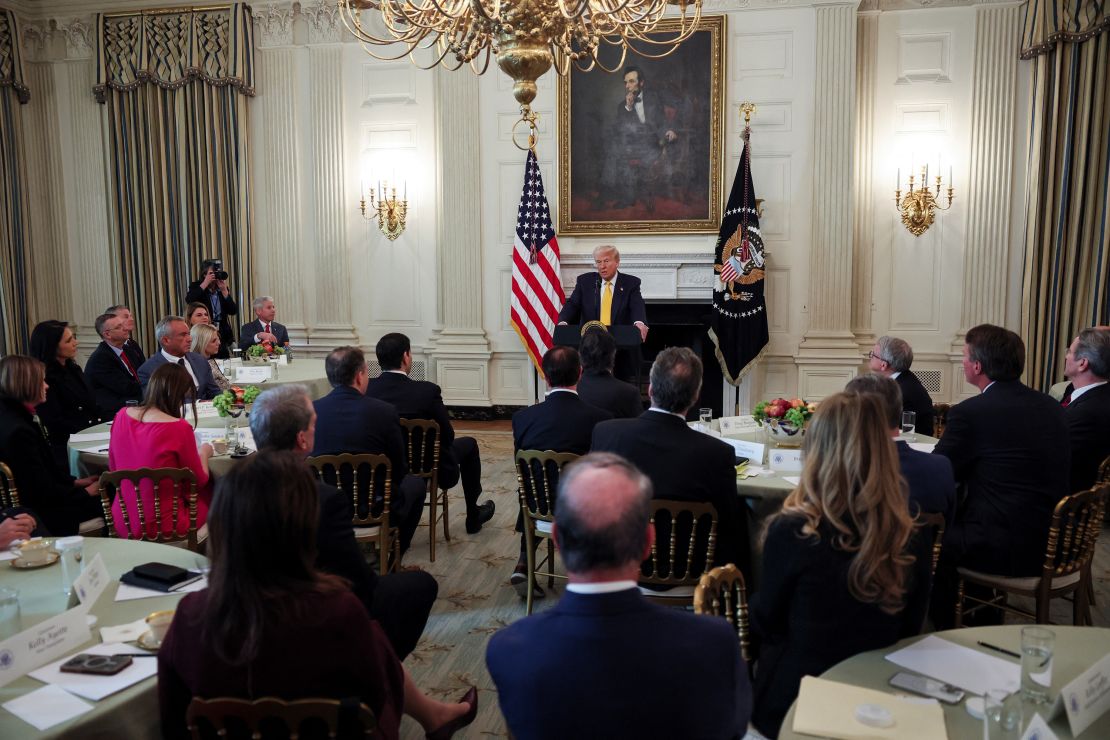CNN
—
President Donald Trump on Friday threatened to strip Maine of its federal funding if it refuses to comply with his executive order banning transgender women from competing in women’s sports, marking the White House’s latest front in the nation’s culture wars.
In a tense exchange with the president, Maine Democratic Gov. Janet Mills had a simple response: “See you in court.”
The testy encounter took place at a bipartisan event as part of the National Governors Association’s winter summit.
It is the latest chapter in states’ response to Trump’s efforts to ban transgender women from competing in women’s sports, the fulfillment of a central Trump 2024 campaign promise. Two transgender girls who attend high school in New Hampshire are suing to challenge the executive order.
Mills’ remarks sparked support and admiration from some, with author Stephen King writing that the governor “makes me proud to be a Maine man” in a post on X.
Here’s what we know about the dispute.
The dispute stems from Trump’s executive order, “Keeping Men Out of Women’s Sports,” one of dozens signed within his first weeks in office.
“With this executive order, the war on women’s sports is over,” the president said when he signed the order.
The order leans on compliance with Title IX, which prohibits discrimination on the basis of sex in education programs or activities that receive funding from the federal government, as well as federal engagement with the private sector.
Under former President Joe Biden’s administration, schools were considered to violate Title IX when they banned transgender students from participating on sports teams.
The Trump administration has taken the opposite view: A White House official previously said that the Trump administration’s position on Title IX is, “If you’re going to have women’s sports, if you’re going to provide opportunities for women, then they have to be equally safe, equally fair, and equally private opportunities, and so that means that you’re going to preserve women’s sports for women.”
The move to ban transgender women from competing in women’s sports is just one of the executive orders Trump has signed that target transgender people. He has also signed orders restricting gender-affirming care for children and indefinitely pausing the enlistment of transgender people in the military. The Department of Health and Human Services has also issued new definitions of words like “sex,” “female,” “woman,” “girl” and “male,” defining sex as “a person’s immutable biological classification as either male or female.”
The NCAA changed its policy in the wake of the executive order, announcing that it would limit participation in women’s sports to athletes assigned female at birth – effectively banning transgender and intersex athletes. Under the NCAA’s previous sport-by-sport policy that went into effect in 2022, each sport’s national governing body determined the participation of transgender athletes.
Although transgender women athletes have become a source of controversy, the number of transgender student athletes is thought to be very small. The NCAA president Charlie Baker said last year he knew of only 10 transgender athletes in the NCAA.

Despite the order, Maine officials, including the governor, the Department of Education and the statewide sports governing body, have maintained that the state has an obligation to provide equal opportunities to all students, including transgender students, under the Maine Human Rights Act. The law was amended in 2021 to include gender identity as a protected class against discrimination in employment, housing, education, extension of credit or access to public accommodations.
Delivering remarks at a Republican Governors Association dinner Thursday night, Trump singled out Maine, saying, “We’re not going to give them any federal funding whatsoever until they clean that up.”
Mills responded in a statement Friday. “If the President attempts to unilaterally deprive Maine school children of the benefit of Federal funding, my Administration and the Attorney General will take all appropriate and necessary legal action to restore that funding and the academic opportunity it provides,” she said. “The State of Maine will not be intimidated by the President’s threats.”
Then, at a Friday event at the White House, the President once again called out Mills.
“I understand Maine, is Maine here, the governor of Maine?” Trump said addressing Republican and Democratic governors in the State Dining Room.
“Yeah, I’m here,” Mills said.
“Are you not going to comply with it?” Trump said.
“I’m complying with state and federal laws,” Mills said.
“Well, we are the federal law,” Trump said. “You better do it because you’re not going to get any federal funding at all if you don’t.”
Trump added: “And by the way, your population, even though it’s somewhat liberal, although I did very well there, your population doesn’t want men playing in women’s sports. So … you better comply, because otherwise you’re not getting any, any federal funding.”
Mills responded: “See you in court.”
“Good, I’ll see you in court, I look forward to that,” Trump said. “That should be a real easy one, and enjoy your life after governor, because I don’t think you’ll be in elected politics.”
After the exchange, the Department of Education’s civil rights division announced a Title IX investigation into Maine’s Department of Education, related to claims it is violating the ban on transgender women athletes.
The department referenced “allegations that (the Maine Department of Education) continues to allow male athletes to compete in girls’ interscholastic athletics and that it has denied female athletes female-only intimate facilities, thereby violating federal antidiscrimination law,” according to a news release from the federal Department of Education.
In response, Mills argued that withholding federal funding would be unconstitutional, and framed the dispute as a larger conflict over the limits of presidential authority – which Trump has pushed in the first weeks of his second term.
“No President – Republican or Democrat – can withhold Federal funding authorized and appropriated by Congress and paid for by Maine taxpayers in an attempt to coerce someone into compliance with his will,” the governor wrote in a statement. “It is a violation of our Constitution and of our laws, which I took an oath to uphold.”
“This is not just about who can compete on the athletic field, this is about whether a President can force compliance with his will, without regard for the rule of law that governs our nation,” the statement continues.
“In America, the President is neither a King nor a dictator, as much as this one tries to act like it – and it is the rule of law that prevents him from being so,” Mills wrote.
In addition to the investigation into the Maine Department of Education, the federal Department of Education also announced that it would investigate a specific Maine school district after reports that a school is allowing “at least one male student to compete in girls’ categories.”
The school district’s superintendent acknowledged the “national media press and attention about one of our high school student athletes, who is transgender, winning a state competition title” and expressed his “unwavering support for all our students” in a Friday statement. He added that the school would have “additional police presence and security” on Monday due to “concerns raised about general safety.”
Previously, Maine Rep. Laurel Libby‚ a Republican, had claimed on Facebook that a transgender student at a Maine high school won a girls’ pole vault competition.
CNN has reached out to the high school named for comment.
This article was originally published by a www.cnn.com . Read the Original article here. .

